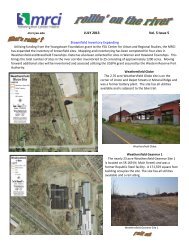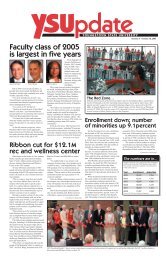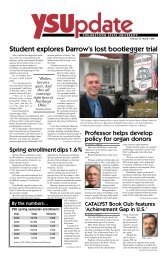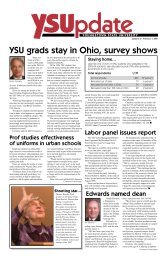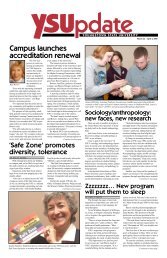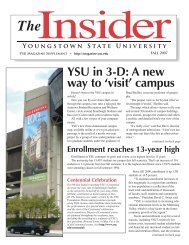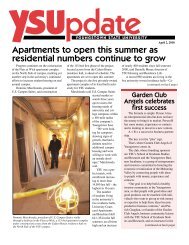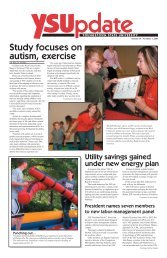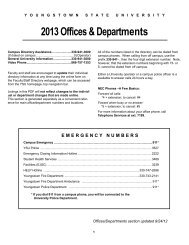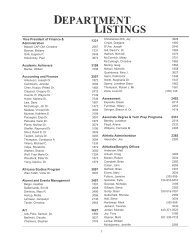N N IAL CEL O - Youngstown State University
N N IAL CEL O - Youngstown State University
N N IAL CEL O - Youngstown State University
Create successful ePaper yourself
Turn your PDF publications into a flip-book with our unique Google optimized e-Paper software.
From the Desk of<br />
Martin Abraham<br />
Martin Abraham, the founding dean of YSU’s new STEM<br />
college, comes to YSU after three years as dean of the College<br />
of Graduate Studies at the <strong>University</strong> Toledo. A chemical<br />
engineer whose research involves hydrogen fuel cell catalysts,<br />
Abraham has a strong record of scholarly publications and<br />
research, including more than 60 refereed publications and<br />
nearly 150 technical presentations. He shares his thoughts on<br />
the new STEM college.<br />
<strong>Youngstown</strong> <strong>State</strong> <strong>University</strong> has taken the innovative step<br />
of merging science and engineering to form a single college<br />
with the ability to take a concept from basic fundamentals<br />
through application. Engineering disciplines apply scientific<br />
principles for the design of products and services, thereby providing<br />
natural connections for the<br />
programs that will now be housed<br />
within our new STEM college.<br />
Such an alignment is consistent<br />
with the way that research and<br />
development is conducted in<br />
industry and leading academic<br />
organizations, and places YSU in<br />
a unique position to capitalize on<br />
trends in science and engineering<br />
education. We should be able<br />
to use our position in support of<br />
state goals to increase enrollment<br />
in STEM disciplines, and to support<br />
economic development in the<br />
<strong>Youngstown</strong> area.<br />
We will look to opportunities<br />
to take advantage of the inherent<br />
synergies of this novel structure,<br />
in education, research and economic<br />
development. Our unique<br />
structure will benefit our faculty<br />
in the development of collaboration<br />
that support their teaching<br />
Martin Abraham, STEM dean<br />
and research missions. In teaching, we will look for innovative<br />
ways to integrate science and engineering principles that enhances<br />
student learning. It will be easier for our faculty to form<br />
research partnerships across disciplines now housed within the<br />
STEM college, providing them with an advantage in competing<br />
for state and federal funding. And community entrepreneurs<br />
and business leaders will be able to approach faculty teams<br />
from multiple departments within the college who will be able<br />
to work across academic disciplines to address their needs at<br />
multiple levels, and from varying directions.<br />
With the state’s emphasis on STEM education, and with<br />
the deep national need for more technically trained individuals,<br />
we are now poised to become a regional and national model<br />
for engineering and science education. I strongly believe that<br />
this new organizational structure provides the best opportunity<br />
for students and faculty to excel, benefiting the university, the<br />
community, the state and our national agenda.<br />
STEM Continued from page 26 CLASS Continued from page 27<br />
STEM fields, according to the Ohio Research Experiences to<br />
Enhance Learning.<br />
The Business Roundtable, an association of chief executive<br />
officers of leading U.S. companies, recently released a report<br />
that calls for doubling the number of STEM college graduates<br />
by 2015. To meet this goal, Ohio colleges and universities must<br />
graduate 16,660 science and engineering students in 2015, up<br />
from 8,330 graduates today. Ohio’s recently approved two-year<br />
budget includes $100 million in college scholarships specifically<br />
targeted to students studying in STEM fields.<br />
“The merger of science and engineering through the new<br />
STEM college creates opportunities at YSU that other universities<br />
will not be able to duplicate,” said Martin Abraham, former<br />
dean of the College of Graduate Studies at the <strong>University</strong> of<br />
Toledo and the founding dean<br />
of YSU’s STEM college.<br />
Tom Oder, YSU assistant<br />
professor of physics, said he<br />
believes the new STEM college<br />
will help faculty as they apply<br />
for research grants.<br />
For instance, Oder and<br />
other physics faculty have<br />
teamed up with faculty in<br />
electrical engineering, biology<br />
and chemistry to apply for<br />
a $370,000 equipment grant<br />
from the National Science<br />
Foundation. The grant would<br />
help purchase instrumentation<br />
for nano-science and chemical<br />
analysis.<br />
Oder said NSF – a strong<br />
supporter of STEM collaborations<br />
– is likely to view the<br />
application more favorably<br />
because of YSU’s STEM<br />
initiative.<br />
“When the NSF and other agencies fund projects, they<br />
want to see that there is already in place a network of collaboration<br />
and support,” he said.<br />
That collaboration was apparent in the spring in a class<br />
taught by Oder – Condense Matter Physics. The class included<br />
students from every one of the STEM disciplines. Ryan Paul, a<br />
graduate student studying mechanical engineering and a member<br />
of the class, said the new STEM college will make such<br />
collaborations more common.<br />
“My best experiences in graduate school have been working<br />
with other students and faculty who are not in engineering<br />
– understanding their perspective, seeing them at work,” said<br />
Paul, who hopes to seek a Ph.D. in materials science after<br />
grad school.<br />
“Even though we have our own areas of focus and specialization,<br />
there is a lot of common ground.”<br />
university,” Waller said. “Literature, psychology, religious<br />
studies, sociology– these are the heart and soul of an education<br />
that goes beyond career education. It’s an education that<br />
makes life fuller, that makes life rich and worth living.”<br />
While there is a growing emphasis on disciplines in the<br />
applied sciences and engineering, Kestner said the liberal<br />
arts and social sciences are experiencing a resurgence of<br />
their own and will continue to have a strong presence on<br />
university campuses.<br />
In fact, according to Fortune magazine, as many as 40<br />
percent of chief executive officers majored in liberal arts in<br />
college. The Wall Street Journal recently reported that future<br />
chief executives may require a broader liberal arts education<br />
that provides a foundation to better operate in an increasingly<br />
complicated, global and fast-moving business arena.<br />
Individuals with educations in liberal arts and social<br />
sciences are more likely to be team players, analytical<br />
thinkers and good communicators with creative solutions<br />
to complex problems.<br />
“What employers need are employees who are able to<br />
change and can learn new skills, and those are the hallmarks<br />
of an education in the liberal arts and social sciences,”<br />
Kestner said. “They’ve learned a lot about people. They’ve<br />
learned a lot about culture and civilizations and how to adapt<br />
to the changing world around them.”<br />
Shearle Furnish, CLASS dean<br />
From the Desk of<br />
Shearle Furnish<br />
Shearle Furnish, the founding dean of YSU’s new CLASS<br />
college, comes to YSU after six years as the head of the<br />
Department of English, Philosophy and Modern Languages<br />
at West Texas A&M <strong>University</strong> near Amarillo. A scholar<br />
of medieval literature who earned a Ph.D. in English from<br />
the <strong>University</strong> of Kentucky in 1984, Furnish has authored<br />
many journal articles, book reviews and conference papers<br />
and made dozens of presentations at academic conferences<br />
throughout the nation. He shares his thoughts on the mission<br />
of the new CLASS college.<br />
I am eager to take up the position of Founding Dean of<br />
the College of Liberal Arts and Social Sciences, immerse myself<br />
in learning the institutional culture of YSU and knowing<br />
the faculty, and involve myself in the greater community. As<br />
we address the identity and mission of the new college, I find<br />
my thoughts sorting into four questions:<br />
What is CLASS to its students?<br />
What is CLASS to its faculty?<br />
What is CLASS to the university?<br />
What is CLASS to the region?<br />
In its large commitment to general education and early<br />
advising, CLASS is in a position to affect first-year success<br />
and retention of students. CLASS is likely to be a first home<br />
for entering students who do not immediately declare a major.<br />
It seems logical and profitable for CLASS to embrace this role<br />
as first home, to impart the identity of CLASS student to<br />
undeclared majors, to make sure they have an academic<br />
home in which to feel welcome and bonded. That way,<br />
they may be more likely to declare a major, more likely<br />
to declare a major in a CLASS discipline, to persist,<br />
thrive, graduate, and be placed in a career or program of<br />
graduate study that pleases and fulfills them.<br />
Smaller than the College of Arts and Sciences,<br />
CLASS may also feel to that degree less an institution<br />
and more a home to its faculty. At any rate, I will try<br />
to encourage the growth of such a feeling. In CLASS,<br />
we are bonded by centuries-long common traditions of<br />
liberal and general education, and by the mission to cultivate<br />
citizenship. In other words, we are bonded by the<br />
common mission to do the work of democracy. Bound by<br />
long common traditions, we should be capable of fellowfeeling,<br />
brotherhood – even-though the idea may seem<br />
trite or saccharine, identity as a family.<br />
The university and region will appreciate CLASS if<br />
we fulfill these potentials. We have much to do already<br />
in educating majors and graduate candidates in our<br />
several disciplines. Successful in these and in the broader<br />
missions I have discussed, we will be relied upon to<br />
improve the preparation and skills of majors in other<br />
colleges, to give the broadest and most basic parts of<br />
preparation to new employees and professionals for the<br />
region, and to contribute problem-solving skills, wisdom,<br />
and prosperity to society.<br />
28 <strong>Youngstown</strong> <strong>State</strong> <strong>University</strong> Summer 2007 29



